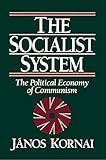The Socialist System : The Political Economy of Communism / János Kornai.
Material type: TextPublisher: Princeton, NJ : Princeton University Press, [2021]Copyright date: ©1992Description: 1 online resource (672 p.)Content type:
TextPublisher: Princeton, NJ : Princeton University Press, [2021]Copyright date: ©1992Description: 1 online resource (672 p.)Content type: - 9780691228020
- Collectivism
- Communism
- POLITICAL SCIENCE / Public Policy / Economic Policy
- Aggregate demand
- Agriculture
- Backwardness
- Bank
- Bribery
- Budget constraint
- Budget
- Calculation
- Capital market
- Capitalism
- Central bank
- Commodity
- Communism
- Competition
- Consideration
- Consumer Goods
- Consumer
- Consumption (economics)
- Credit (finance)
- Currency
- Customer
- Czechoslovakia
- Decentralization
- Developed country
- Drawback
- East Germany
- Economic development
- Economic equilibrium
- Economic planning
- Economic policy
- Economics
- Economist
- Economy
- Employment
- Entrepreneurship
- Exchange rate
- Expense
- Household
- Ideology
- Incentive
- Income
- Industry
- Inflation
- Institution
- Interest
- Investment fund
- Investment
- Legislature
- Mao Zedong
- Market economy
- Market mechanism
- Market price
- Market socialism
- Marxian economics
- Marxism
- Nationalization
- Organization
- Paternalism
- Payment
- Planned economy
- Planning
- Political economy
- Political structure
- Politician
- Power structure
- Price controls
- Price fixing
- Price level
- Price system
- Pricing
- Private property
- Private sector
- Public sector
- Quantity
- Rationing
- Regulation
- Relative price
- Representative democracy
- Requirement
- Saving
- Scarcity
- Shortage economy
- Shortage
- Socialist economics
- Socialist state
- Soviet Union
- State (polity)
- Subsidy
- Superiority (short story)
- Supply (economics)
- Supply and demand
- Tax
- Trade union
- Unemployment
- Utilization
- Wage
- Wealth
- Workforce
- Writing
- Yugoslavia
- 335.43 20
- HX73 .K6715 1992eb
- online - DeGruyter
| Item type | Current library | Call number | URL | Status | Notes | Barcode | |
|---|---|---|---|---|---|---|---|
 eBook
eBook
|
Biblioteca "Angelicum" Pont. Univ. S.Tommaso d'Aquino Nuvola online | online - DeGruyter (Browse shelf(Opens below)) | Online access | Not for loan (Accesso limitato) | Accesso per gli utenti autorizzati / Access for authorized users | (dgr)9780691228020 |
Frontmatter -- Contents -- List of Figures -- List of Tables -- Preface -- PART ONE: POINTS OF DEPARTURE -- 1. The Subject and Method -- 2. Antecedents and Prototypes of the System -- PART TWO: THE ANATOMY OF THE CLASSICAL SYSTEM -- 3. Power -- 4. Ideology -- 5. Property -- 6. Coordination Mechanisms -- 7. Planning and Direct Bureaucratic Control -- 8. Money and Price -- 9. Investment and Growth -- 10. Employment and Wages -- 11. Shortage and Inflation: The Phenomena -- 12. Shortage and Inflation: The Causes -- 13. Consumption and Distribution -- 14. External Economic Relations -- 15. The Coherence of the Classical System -- PART THREE: SHIFTING FROM THE CLASSICAL SYSTEM -- 16. The Dynamics of the Changes -- 17. The "Perfection" of Control -- 18. Political Liberalization -- 19. The Rise of the Private Sector -- 20. Self-Management -- 21. Market Socialism -- 22. Price Reforms -- 23. Macro Tensions -- 24. Concluding Remarks -- References -- Appendix: Bibliography on Postsocialist Transition -- Author Index -- Subject Index
restricted access online access with authorization star
http://purl.org/coar/access_right/c_16ec
To understand the dramatic collapse of the socialist order and the current turmoil in the formerly communist world, this comprehensive work examines the most important common properties of all socialist societies. JNBnos Kornai brings a life-long study of the problems of the socialist system to his explanation of why inherent attributes of socialism inevitably produced in-efficiency. In his past work he has focused on the economic sphere, maintaining consistently that the weak economic performance of socialist countries resulted from the system itself, not from the personalities of top leaders or mistakes made by leading organizations and planners. This book synthesizes themes from his earlier investigations, while broadening the discussion to include the role of the political power structure and of communist ideology. Kornai distinguishes between two types, or historical phases, of socialism. The "classical socialism" of Stalin, Mao, and their followers is totalitarian and brutally repressive, but its components fit together and make up a coherent edifice. Associated with names like Tito, KNBdar, Deng-Xiaoping, and Gorbachev, "reform socialism" relaxes repression, but brings about a sharpening of inner contradictions and the eventual dissolution of the system. Kornai examines the classical system in the first half of the book, and moves on to explore the complex process of reform in the second half. The Socialist System is addressed to economists in the first place, but also to political scientists, sociologists, and historians. In addition, it will appeal to policymakers, business analysts, and government officials who need to understand either formerly or presently communist countries.
Mode of access: Internet via World Wide Web.
In English.
Description based on online resource; title from PDF title page (publisher's Web site, viewed 27. Jan 2023)


